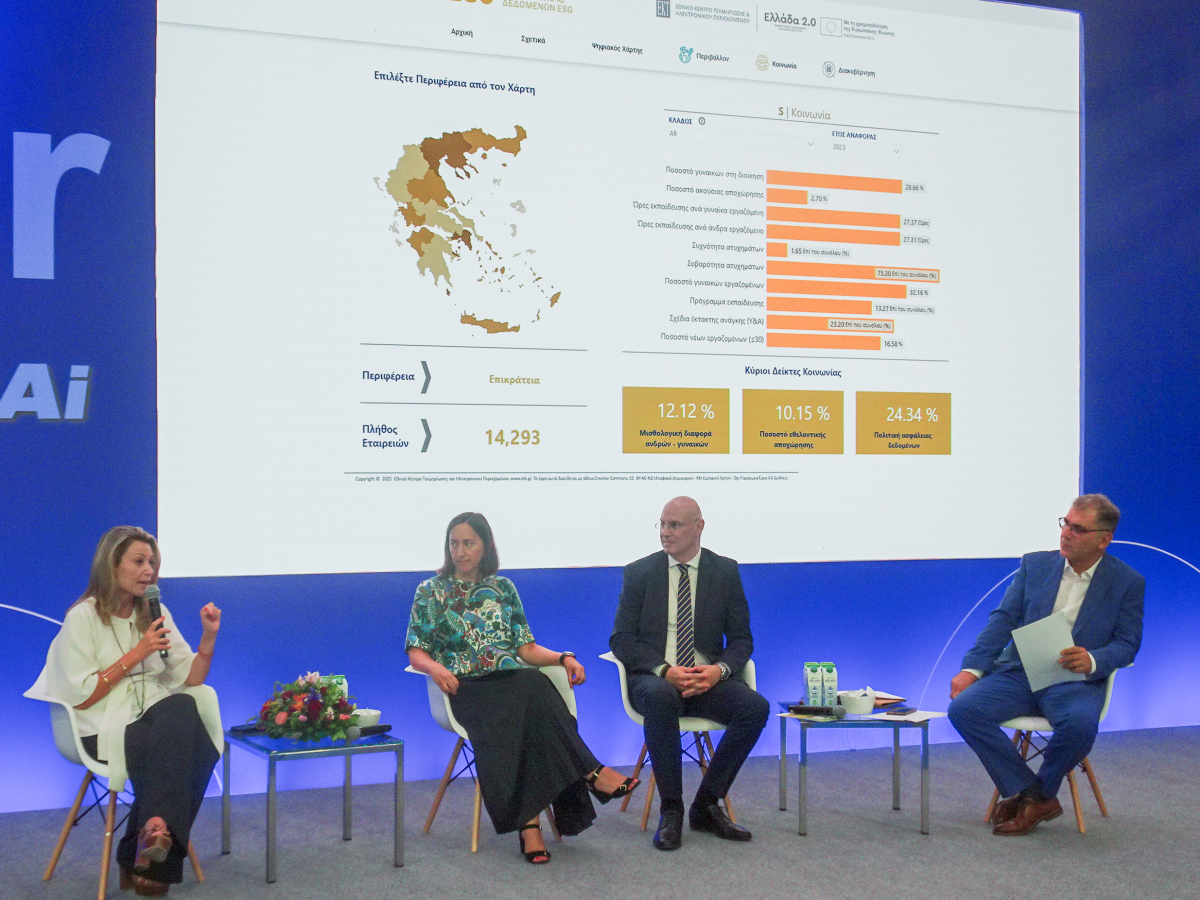
The National ESG Data Map, which for the first time presents the state of Greek businesses based on ESG data, was unveiled at an event organized during the 89th Thessaloniki International Fair by the National Documentation Centre (EKT), a body under the Ministry of Digital Governance and Artificial Intelligence. This initiative constitutes a model of best practice at both the European and international level (EU, OECD).
The goal of this flagship initiative is to create a reliable, transparent, and functional digital infrastructure for the systematic collection, standardization, and analysis of Environmental, Social, and Governance (ESG) data, contributing to the strengthening of the resilience and sustainability of Greek enterprises.
The National Digital ESG Data Map, available at https://esg.ekt.gr, currently aggregates, analyzes, and visualizes data from 14,293 businesses across Greece’s 13 regions, covering 11 sectors of economic activity and producing 38 indicators.
At its current stage, the platform collects data from multiple sources (such as the Hellenic Development Bank, the Organization for Natural Environment and Climate Change, and the Ministry of Environment and Energy). Through advanced processing and methodologies, ESG indicators are then generated. In the near future, data from additional institutional actors within the data governance ecosystem will also be incorporated.

The Minister of Digital Governance and Artificial Intelligence, Mr. Dimitris Papastergiou, in his address, stated: "The documentation of information is particularly important in an era where systems are now interoperable. We are no longer simply seeking data, but rather how to properly document it so that information can be reused by Artificial Intelligence. The excellent work of EKT sets expectations very high. Within the framework of our AI strategy, EKT can and must assume a more substantial role in how we document information. We often believe that AI knows everything and provides the right answers. However, AI responds based on the data with which we feed it. Therefore, a major challenge begins for all of us: from journalism and the search for truth and how we certify it, to how we classify and safeguard knowledge for future generations."

The Deputy Minister of Digital Governance and Artificial Intelligence, Mr. Christos Dermendzopoulos, underlined: "EKT demonstrates that it is a strategic pillar of knowledge and innovation. With the National ESG Data Map, which we inaugurate today, businesses gain a significant tool: they can analyze and compare their performance, adopt best practices, and align with European data and contemporary trends. This initiative serves both businesses and the State, enhancing transparency and sustainable growth. It reflects the vision of the Ministry and the government for less bureaucracy and greater value for citizens and enterprises. Warm congratulations to EKT and to all those who contributed to this effort, which strengthens Greece’s position in the European and international arena."


The Chairman of the Board of EKT, Mr. Lazaros Vryzidis, in his address, stated: "This is the second year we are participating in the Thessaloniki International Fair with a theme that concerns businesses. I believe that companies now understand they can no longer operate in a traditional way. Reforms require the use of scientifically grounded tools – and this is exactly what EKT provides. It develops actions and initiatives that benefit Greek entrepreneurship, particularly in the collection, utilization, and dissemination of knowledge for the entire country."
During the open discussion that followed, as part of the event “National ESG Data Map – Digital Tools for Strengthening the Resilience and Sustainability of Greek Enterprises” at Pavilion 12 of the Ministry of Digital Governance and Artificial Intelligence, the participants included: Dr. Kyriakos Tolias, Director of EKT; Ismini Papakyriyllou, CEO of the Hellenic Development Bank (HDB); and Vasiliki Lazarakou, Chair of the Hellenic Capital Market Commission. Professor George Pagoulatos, Greece’s Ambassador to the OECD, contributed with a pre-recorded speech. The discussion was moderated by Dimitris Venieris, Director of STATUS FM 107.7.

Presenting the National Digital ESG Data Map, Dr. Kyriakos Tolias, Director of EKT, stated: "EKT’s new initiative for the collection, standardization, and dissemination of national ESG data enhances transparency, accountability, and the sustainable development of Greek enterprises. Leveraging EKT’s expertise in data, we have created a digital tool that aims to capture the true picture of Greek businesses of all sizes and sectors in terms of sustainability and resilience. A tool that we hope will serve as an international benchmark at the EU and OECD level." He further emphasized: "The next step concerns the scaling up of this project and the expansion of the number of participating businesses, as well as the introduction of AI services. We must convince companies that ESG criteria are not merely an obligation, but a strategic plan that ensures sustainability and resilience—through comparison with peers in their sector and by showcasing their strengths."


Ismini Papakyriyllou, CEO of the Hellenic Development Bank (HDB), spoke about the bank’s digital tools, focusing on the ESG Tracker, which helps businesses adopt ESG criteria. She stated: "HDB is creating a modern support ecosystem for SMEs, with innovative tools that help companies enhance their sustainability and become more competitive. The ESG Tracker is a free and user-friendly sustainability self-assessment platform, which has already been used by over 13,000 businesses. This tool, besides serving as an educational and process-simplification resource for very small enterprises, also acts as a prerequisite for accessing certain financing instruments." She emphasized that ESG criteria will become an increasingly critical factor in credit evaluation processes, making it essential for SMEs to understand their position regarding ESG matters.
Vasiliki Lazarakou, Chair of the Hellenic Capital Market Commission, highlighted the importance of ESG data and indicators for the economy, competitiveness, and sustainable entrepreneurship, as well as the role of Artificial Intelligence tools for automated data collection, already applied at the Commission. She noted: "Accurate and well-documented ESG disclosure by listed companies is a prerequisite for transparency, reliability, and effective supervision. It is critical for companies to provide comparable and measurable data on their actions regarding the environment, society, and corporate governance. In this context, the Digital ESG Data Map proves to be a valuable tool for gathering and analyzing this information." She further stressed that: "Although ESG legislation is complex and continuously evolving, it is a decisive factor for the development of responsible, green, and socially accountable companies." She also underlined the need for the education of both companies and supervisory authorities, as well as the importance of collaboration among all stakeholders.

Professor George Pagoulatos, Greece’s Ambassador to the OECD, contributed to the discussion with a pre-recorded speech, in which he highlighted that, at an international level, ESG criteria have become a strategic axis for policy-making and business development, while the OECD is implementing a series of related initiatives and actions. Referring to the Digital ESG Data Map developed by EKT, he emphasized that it constitutes a pioneering digital tool that enhances transparency and comparability of data across businesses and sectors, while also strengthening accountability and the strategic use of ESG indicators. He noted: "If systematically leveraged by the state, the Map can not only assist businesses, but also contribute to the provision of reliable data for targeted sustainable development policies and enhance trust between the state, businesses, and society, within the framework of a resilient and fair economy."


Benefits of the Digital ESG Data Map
With broad coverage of companies, sectors, and geographic regions, and alignment with international frameworks, the Digital ESG Data Map serves as a national reference point for assessing sustainability and responsible entrepreneurship in Greece, offering significant benefits:
- Bridging local and international standards: It acts as a bridge between the Greek business landscape and international sustainability standards.
- Providing a systematic, transparent view: It enables businesses, institutions, and investors to gain a systematic, comparable, and transparent overview.
- Preparing the market for regulatory requirements: It supports market readiness for stricter European directives (CSRD) and the green transition.
- Informing evidence-based policies: It allows for the design of well-founded policies for investors, the state, universities, and social stakeholders, based on real data.
The platform has been developed so that partner businesses of EKT can directly compare their performance with other companies of similar size, sector, and geographic location, based on ESG criteria.

In a next phase, by leveraging Artificial Intelligence applications, the platform will also provide advisory services, enabling businesses to identify best practices and improve their ESG performance, thereby enhancing their sustainability and competitiveness. At the same time, it will support public and private sector organizations in aligning with European sustainability standards, offering tools for comparative assessment, risk forecasting, and strategic planning.
Watch the event video (in GR):















